Radiotélévision Caraïbes revealed to AyiboPost having lost about fifty years worth of archives
The media writes the first pages of history.
But in Haiti, the material to write this grand national narrative disappears with political turmoil, natural disasters, and technological troubles.
Radiotélévision Caraïbes (RTVC), one of the oldest stations in the region, revealed to AyiboPost that they have lost ‘about fifty years of history’ during the earthquake on January 12, 2010.
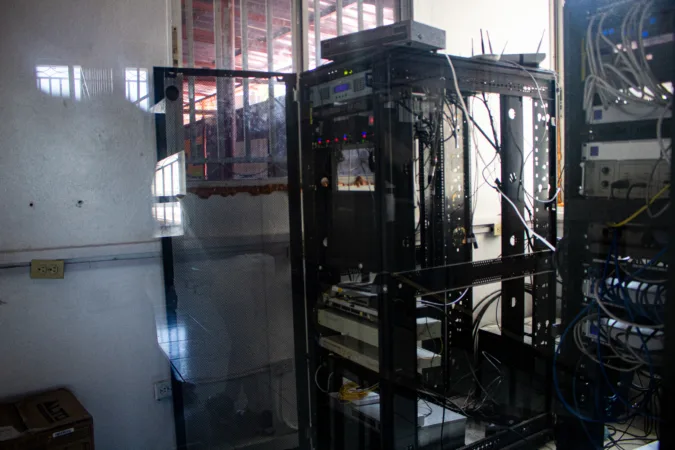
View of the ‘machine room’ housing a set of automatic recording devices for the broadcasts of Radiotélévision Caraïbes, on September 5, 2023. | © Jean Feguens Regala/AyiboPost
The former building that housed the station was set on fire after the earthquake, taking with it “the few remaining archives,” details Marc Anderson Bregard, managing director of RTVC.
The loss of the radio archives is more than just a matter concerning the private outlet. “Losing the radio archives means losing a part of our heritage,” acknowledges the head of the station, which first began broadcasting in 1949.
The former building that housed the station was set on fire after the earthquake, destroying what little archives remained.
The National Television of Haiti (TNH) is also among the media outlets affected by this issue.
Founded in 1977, the public station lost everything from the dictatorial period of 1984 to 1987, according to its current director, Gamal Jules Augustin.
« At the time of the embargo, the Haitian government didn’t have the money to buy tapes, » explains Augustin to AyiboPost. Given that those in charge of the [public] media had grudges against the Duvalier regime, « all the tapes with content [on this subject] were reused, » reports the director.
Due to the 2010 earthquake, « the radio station suffered more losses than the television station, » continues Augustin, who was a civil servant at the national radio.
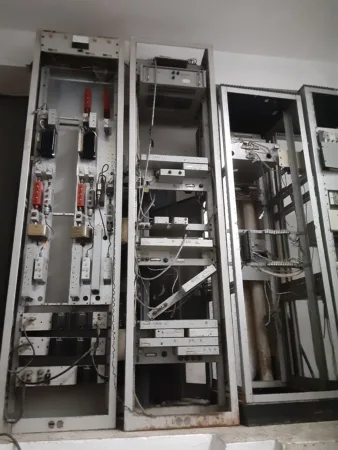
An old transmitter of Haiti’s National Television, photographed on September 7, 2023. | Photos (c) : Jérôme Wendy Norestyl/AyiboPost
There is no institution in Haiti dedicated to archiving media content. There are also no appropriate public policies in place to preserve multimedia archives, which are important raw materials for academics, notably.
In principle, the state media, RTNH, should transfer its content to the National Archives of Haiti (ANH) every five years. However, in recent years, « they have not made any transfers and have kept all of the archives for themselves, » says Jean Wilfrid Bertrand, managing director of the ANH, in an interview with AyiboPost.
However, the director continues, « we do not raise this issue because we do not have the necessary conditions for conservation. » According to the Director of ANH, the institution also does not have a suitable building for this purpose.
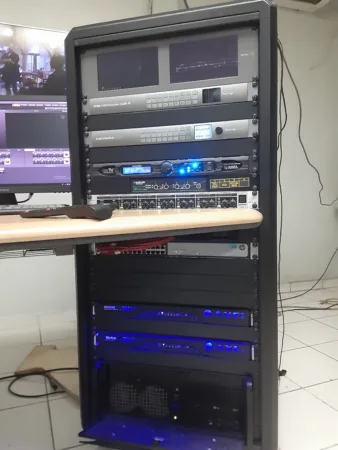
A server hosting all the content of Haiti’s National Television on September 7, 2023. | Photos (c) : Jérôme Wendy Norestyl/AyiboPost
Private media outlets do not establish working partnerships with the ANH. « Everything is out of control, and [these media outlets] do as they please with their content, » reveals Jean Wilfrid Bertrand, Managing Director of ANH, to AyiboPost.
Radio Télé Métropole, which is over half a century old, has also lost a part of its archives.
The station has been broadcasting since 1970, but only possesses its productions from 1980 to present day, according to one official.
The cataloging of television programs only began in 2013, despite the station being established in 2009.
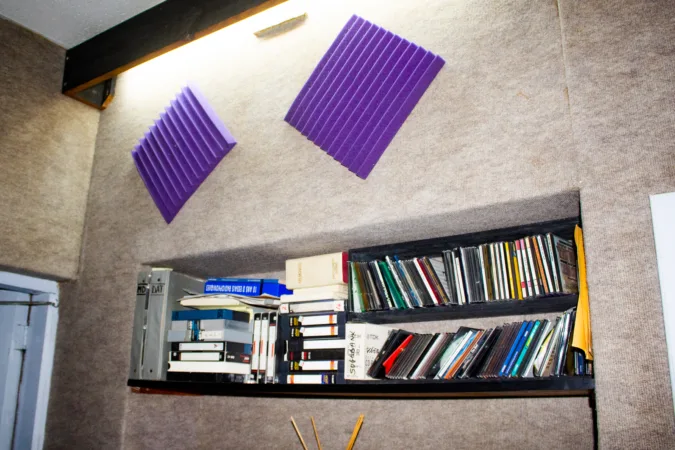
View of a shelf containing old TV and radio show tapes at Radio Télé Métropole on September 5, 2023. | © Jean Feguens Regala/AyiboPost
The entity has not initiated an evaluation, but « we have lost a lot of things, » explains Richard Widmaier, the director of Métropole, to AyiboPost. However, he continues, « I have some content that I am trying to save, » such as programs with candidates during the 1990 elections.

View of a shelf storing a collection of disks containing recordings of broadcasts on September 5, 2023. | © Jean Feguens Regala/AyiboPost
The situation requires urgent intervention at Radio Télé Kiskeya. A fire that occurred in December 2018 devastated a significant portion of the station’s archives.
The institution is also facing difficulties in preserving its audio tapes, most of which are stacked in boxes. Without protection from heat and humidity, these audio recordings are « at risk of disappearing, » says Director Marvel Dandin.
« We have 10 years of audio archives in disarray that are endangered, » Marvel Dandin mentions. « It is with sadness and a sense of helplessness that I confirm that we do not have the means to take adequate action, » says the director, who notes that the radio continues to store all of its audio assets online.

On September 5, 2023, Marvel Dandin, the director of Radio Télé Kiskeay, describes the recording equipment in the media studio. | © Jean Feguens Regala/AyiboPost
Read also : Lyonel Trouillot | Adieu Liliane ! L’infatigable veilleuse, l’Oracle !
The written and audio content generated by the media is crucial for the future of the country.
« Oral archives help us understand the evolution of society and what was the order of the day, » says Frantz Voltaire, one of the founders of the International Center for Haitian, Caribbean, and Afro-Canadian Documentation and Information (CIDHICA), an entity specializing in the preservation of photographic, historical, and literary archives.
The historian emphasizes the need for awareness and efforts to « preserve archives, in order to pass on access to a body of societal knowledge to future generations. »
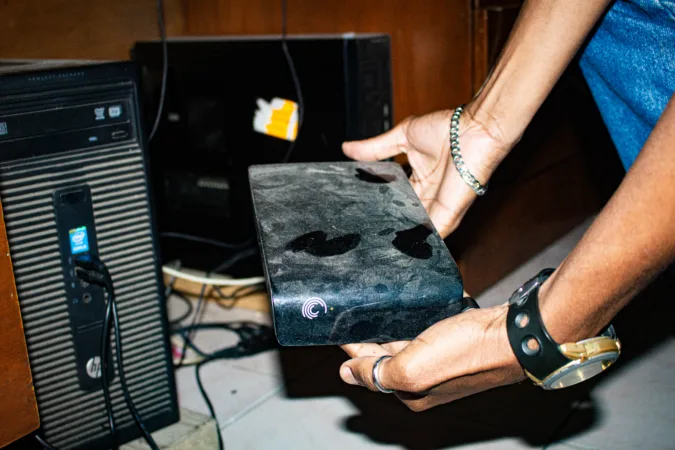
An external hard drive used to record content in the Radio Télé Kiskeya studio on September 5, 2023. | © Jean Feguens Regala/AyiboPost
During the years leading up to the dictatorship and even after, media stations used various multimedia equipment such as magnetic tapes, cassettes, reels, and more.
These fragile media formats take up space and require special care to prevent deterioration. « We were very helpless, » said Gotson Pierre, head of the Medialternatif group and editor of the online agency AlterPresse.
According to this influential figure in the Haitian press for many decades, the preservation of archives is « a very important field with crucial stakes. »
And even though the times have evolved with the advent of new storage devices, preserving archives remains a challenge.
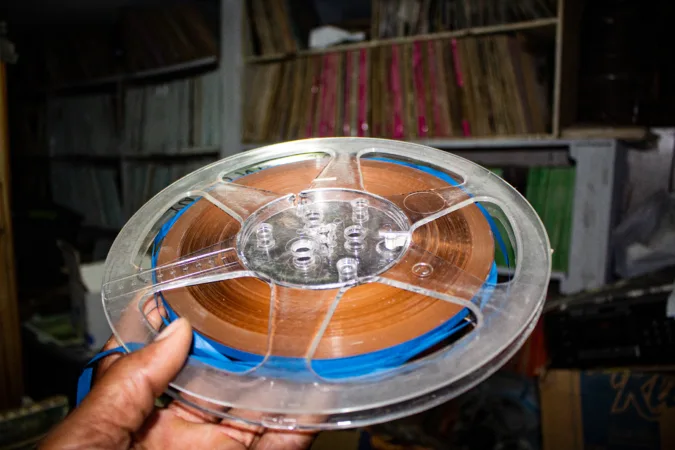
An old magnetic tape in the Radio Télé Métopole record library on September 5, 2023. | © Jean Feguens Regala/AyiboPost
Today, every institution tries to do its best with the resources at hand. However, Gotson Pierre believes that the issue of archives « warrants a systematic and sustainable approach. »
Platforms like Facebook or YouTube offer free storage options, as long as they continue to exist.
Read also : Les émissions des médias haïtiens enrichissent des «voleurs» sur YouTube
Since 2006, Radiotélévision Caraïbes launched its web presence, following a significant investment in equipment.
AlterPresse, launched in 2001, and AlterRadio, on air since 2015, regularly update their internal databases, according to Gotson Pierre, the initiator of Medialternatif.
TNH, on the other hand, digitizes its productions on an internal server connected to an international one, according to Gamal Augustin. These archives, he says, will eventually be sent to ANH.
Today, each institution tries to do its best with the means at hand.
For many years, Radio Métropole filed its productions on tapes, according to Director Richard Widmaier. This practice, he says, continues today with the transfer of these same files to hard drives before storing them in the cloud.
Richard Widmaer reveals that the National Media Association (ANMH) planned to set up an audiovisual press museum to manage its members’ archives. This project has yet to materialize.
In the meantime, several media outlets disappear along with their archives.

An old vinyl record in the Radio Télé Métopole music collection, on September 5, 2023. | © Jean Feguens Regala/AyiboPost
Radio Haïti Inter is one of few exceptions, or almost, as the station led by the late Jean Dominique and his wife Michèle Montas lost « three-quarters » of the content produced before 1986.
See also : Une artiste classique américaine sort un album inspiré par « Radio Haïti Inter »
More than half of the archives from the tumultuous periods between 1987 and 1990 are unrecoverable or lost, Michele Montas reported to AyiboPost.
The station was destroyed in 1980 under the dictatorship, and tapes were severely damaged. Some were reduced to pieces, while others were left scattered on the floor at the radio station.
Upon their return, the staff found the tapes in perishable conditions: covered in dust and at mercy of humidity. Untreated, these tapes were stored in boxes for a very long time.
More than half of the archives from the tumultuous period between 1987 and 1990 are irretrievable or lost.
Furthermore, Michèle Montas continues, « we erased many things to record over them. » Investigations were a priority, according to Montas, although among these contents, there are fragments of interrupted recordings.
« Between 1986 and 1991, we had better organized archives of debate shows, long interviews with Jean Dominique, and investigative reports from the newsroom, » Michèle Montas recalls.
Following another closure in 1991, during the coup that ended Jean-Bertrand Aristide’s rule, most of the radio’s staff went into exile and returned in 1994.
See also : L’histoire méconnue d’Antoine Rodolphe Hérard, père du rappeur Master Dji
After the passing of Jean Dominique in 2000, the tape boxes were stored in a garage because there was no organization in Haiti capable of restoring the tapes to preserve them.
That’s why Michèle Montas contacted the human rights department at Duke University.
The American university expressed interest in holding the archives on the condition that they « are digitized, living, and accessible to everyone, » emphasizes Michèle Montas.

Storage devices at the Radio Télé Kisqueya studio on September 5, 2023. | © Jean Feguens Regala/AyiboPost
The project to save the archives of Radio Haïti Inter lasted for five years and resulted in the preservation of nearly 2,500 reports, investigations, programs, etc., documenting the period from 1972 to 2003.
If the cataloging of multimedia content is done for the sake of conservation, it is also a work of preserving memory. According to Michèle Montas, « this is important to prevent repeating the same mistakes of the past. »
English translation by Sarah Jean.
Cover image : On September 5, 2023, Marvel Dandin, the director of Radio Télé Kiskeay, describes the recording equipment in the media studio. | © Jean Feguens Regala/AyiboPost
Stay in touch with AyiboPost through :
► Our Telegram canal : click here
► Our WhatsApp channel : click here
► Our WhatsApp Community : click here






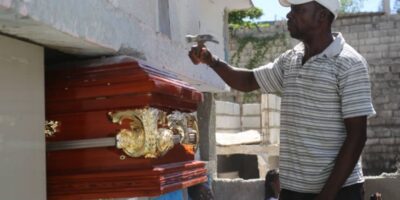
Comments